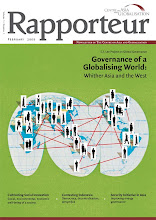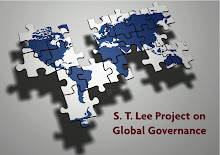
By Kishore Mahbubani
When I was a diplomat I used to say that diplomacy was the world’s second oldest profession but I always hastened to add that it bore no relationship to the oldest profession. The reason why it is old is because since human beings began organizing themselves into tribes and societies, there were rivalries, struggles for power which often led to conflict, frequently over territory. Diplomacy was therefore invented to handle the eternal challenge of geopolitics.
In the modern and more civilized world order we live in, where the prospect of any direct war between any two major powers is a remote possibility (partly because of the advent of nuclear weapons), many of us would like to believe that geopolitics has taken a back seat in the face of growing global interdependence. One stark reality about the 21st Century that we should hoist in is that geopolitics will return with a vengeance, even though many of the rivalries and contests will be played out beneath the surface. The naked eye will not catch these new geopolitical contests. We will need a sophisticated vision to understand the new geopolitical terrain that is rapidly emerging. And the terrain could become treacherous.
History teaches us that whenever a dominant power begins to lose power relatively, new opportunities are created for rising powers. We are living in such an era. The United States is slowly beginning to lose the unquestioned dominance it had over the global order. Fortunately, for the world, the United States has been on balance a benevolent power. The 1945 rules-based order it created (with multilateral institutions like the UN, IMF, WB and GATT) were a great gift to the world. This multilateral fabric explains the remarkable explosion we have seen in both global economic growth and global trade. Without the United States acting as the ultimate guarantor of this global system, we would not have had the global stability we have seen.
The American people were happy to see United States act as a custodian of this benign multilateral order because they believed that with global stability and trade liberalization, they would naturally emerge as the biggest winners of the system. Now, in a remarkable reversal, fewer and fewer Americans believe that they will benefit from global openness. Instead, more and more of them believe that they will lose their jobs and prosperity to China and India.
In the next ten years, there will be an intense debate in United States on how much global responsibility it should take on. We cannot tell the outcome. Short term populist pressures could lead to greater protectionism (and we have seen many warning signals from the US Congress). If the United States walks in that direction and stirs all kinds of national retaliations, we should be prepared to see the gradual unraveling of our benign global order.
The big problem that the world faces is that there is no other natural global leader to take on the benign role that the United States has played. The other natural candidate is the European Union (EU). Indeed, it has hitherto played a helpful and constructive role in supporting the benign role of the United States. However, it has no capacity to step into the shoes of the United States as the global leader. The reasons are complex but they have to do with highly divisive decision-making process of the EU. The result of having to reconcile the interests of 27 member-states is that the EU is driven down to the lowest common denominator. The Irish veto of the Lisbon Treaty process destroyed the chance of having a single Foreign Minister to represent the EU’s global voice. To paraphrase Henry Kissinger, we also lost the prospect of having a single telephone number to call in Europe.
To make matters worse, the EU has become geopolitically incompetent. Much to the chagrin of my European friends, I have pointed out the EU’s greatest civilizational achievement of creating zero prospect of war inside the EU has to be balanced against the failure of the EU to create zones of security and prosperity outside their immediate borders. Hence all the long-term threats to the EU are going to come from their immediate neighboring environments: North Africa, Middle East, the Balkans and the Caucasus. The recent unfortunate Georgian episode provides a vivid and powerful case study of the EU’s geopolitical incompetence. However, it must also be emphasized that the new models of rules-based global cooperation will in one way or another be inspired by the EU models of cooperation. Hence we must give the EU the credit it deserves.
By contrast to the EU, the most geopolitically competent great power in the world today is China, which has the prospect of emerging as the world’s greatest power with its economy surpassing that of the United States. History teaches us that relations between the world’s greatest power and the world’s greatest emerging power have always been tense. Hence, if history is a guide, we should be seeing rising geopolitical tensions between United States and China. Instead we are seeing the exact opposite phenomenon. Why?
The reason is simple. China is emerging as the most geopolitically competent rising power. Luck has helped. Both 9/11 and the recent Georgian fiasco, which created new tensions between the West and Russia, were geopolitical gifts to China. But the Chinese also know how to capitalize on their luck. They have been shrewdly helpful to the United States on some of its crucial geopolitical challenges, including Iraq, Iran and North Korea. The United States reciprocated by squeezing President Chen Shui-bian when he was in power. Hence, the Taiwan issue which could have been the flashpoint for the US – Chinese rivalry (as it did when President Bill Clinton almost sent aircraft carriers through the Taiwan Straits in 1996) has become a vivid example of a new US-China cooperation. This is a geopolitical miracle which should go into the Guinness Book of World Records.
China has carefully adopted a low profile, wisely adhering to Deng Xiaoping’s advice not to aspire for global leadership. But this low profile has now become a double-edged sword. It has defused American worries about China. But it also prevents China from aspiring to become the custodian of the global system. India, the other possible candidate, is also not ready to do so. Hence, at a time when rapid globalization is creating a small global village where village leadership is critical, we have a situation where all the major powers – US, EU, China and India – are shunning global leadership. This is a prescription for trouble. If the benign global order deteriorates and we move away from a rules-based regime, we will inevitably see new geopolitical rivalries and contests emerge. When that happens, the need for the world’s second oldest profession to perform well will never be greater.
The only consolation for Singapore is that it does well in geopolitical competence. Now that I am no longer a diplomat, I can create my own index of geopolitical competence. In this index, I give the former Soviet Union a 2 (for losing a great empire without a shot), the EU a 4 (for reasons given above), the USA a 7 (for remaining as the world’s greatest power) and China a 9 (for emerging as a great power with so much skill and deftness. And I would give Singapore a 10 out of 10. This is a result of extraordinary leadership we have enjoyed. Hence, at a time when we may be moving into treacherous geopolitical terrain, the real challenge for Singapore is to maintain this extraordinary leadership.
Kishore Mahbubani is the Dean of the Lee Kuan Yew School of Public Policy, National University of Singapore.
When I was a diplomat I used to say that diplomacy was the world’s second oldest profession but I always hastened to add that it bore no relationship to the oldest profession. The reason why it is old is because since human beings began organizing themselves into tribes and societies, there were rivalries, struggles for power which often led to conflict, frequently over territory. Diplomacy was therefore invented to handle the eternal challenge of geopolitics.
In the modern and more civilized world order we live in, where the prospect of any direct war between any two major powers is a remote possibility (partly because of the advent of nuclear weapons), many of us would like to believe that geopolitics has taken a back seat in the face of growing global interdependence. One stark reality about the 21st Century that we should hoist in is that geopolitics will return with a vengeance, even though many of the rivalries and contests will be played out beneath the surface. The naked eye will not catch these new geopolitical contests. We will need a sophisticated vision to understand the new geopolitical terrain that is rapidly emerging. And the terrain could become treacherous.
History teaches us that whenever a dominant power begins to lose power relatively, new opportunities are created for rising powers. We are living in such an era. The United States is slowly beginning to lose the unquestioned dominance it had over the global order. Fortunately, for the world, the United States has been on balance a benevolent power. The 1945 rules-based order it created (with multilateral institutions like the UN, IMF, WB and GATT) were a great gift to the world. This multilateral fabric explains the remarkable explosion we have seen in both global economic growth and global trade. Without the United States acting as the ultimate guarantor of this global system, we would not have had the global stability we have seen.
The American people were happy to see United States act as a custodian of this benign multilateral order because they believed that with global stability and trade liberalization, they would naturally emerge as the biggest winners of the system. Now, in a remarkable reversal, fewer and fewer Americans believe that they will benefit from global openness. Instead, more and more of them believe that they will lose their jobs and prosperity to China and India.
In the next ten years, there will be an intense debate in United States on how much global responsibility it should take on. We cannot tell the outcome. Short term populist pressures could lead to greater protectionism (and we have seen many warning signals from the US Congress). If the United States walks in that direction and stirs all kinds of national retaliations, we should be prepared to see the gradual unraveling of our benign global order.
The big problem that the world faces is that there is no other natural global leader to take on the benign role that the United States has played. The other natural candidate is the European Union (EU). Indeed, it has hitherto played a helpful and constructive role in supporting the benign role of the United States. However, it has no capacity to step into the shoes of the United States as the global leader. The reasons are complex but they have to do with highly divisive decision-making process of the EU. The result of having to reconcile the interests of 27 member-states is that the EU is driven down to the lowest common denominator. The Irish veto of the Lisbon Treaty process destroyed the chance of having a single Foreign Minister to represent the EU’s global voice. To paraphrase Henry Kissinger, we also lost the prospect of having a single telephone number to call in Europe.
To make matters worse, the EU has become geopolitically incompetent. Much to the chagrin of my European friends, I have pointed out the EU’s greatest civilizational achievement of creating zero prospect of war inside the EU has to be balanced against the failure of the EU to create zones of security and prosperity outside their immediate borders. Hence all the long-term threats to the EU are going to come from their immediate neighboring environments: North Africa, Middle East, the Balkans and the Caucasus. The recent unfortunate Georgian episode provides a vivid and powerful case study of the EU’s geopolitical incompetence. However, it must also be emphasized that the new models of rules-based global cooperation will in one way or another be inspired by the EU models of cooperation. Hence we must give the EU the credit it deserves.
By contrast to the EU, the most geopolitically competent great power in the world today is China, which has the prospect of emerging as the world’s greatest power with its economy surpassing that of the United States. History teaches us that relations between the world’s greatest power and the world’s greatest emerging power have always been tense. Hence, if history is a guide, we should be seeing rising geopolitical tensions between United States and China. Instead we are seeing the exact opposite phenomenon. Why?
The reason is simple. China is emerging as the most geopolitically competent rising power. Luck has helped. Both 9/11 and the recent Georgian fiasco, which created new tensions between the West and Russia, were geopolitical gifts to China. But the Chinese also know how to capitalize on their luck. They have been shrewdly helpful to the United States on some of its crucial geopolitical challenges, including Iraq, Iran and North Korea. The United States reciprocated by squeezing President Chen Shui-bian when he was in power. Hence, the Taiwan issue which could have been the flashpoint for the US – Chinese rivalry (as it did when President Bill Clinton almost sent aircraft carriers through the Taiwan Straits in 1996) has become a vivid example of a new US-China cooperation. This is a geopolitical miracle which should go into the Guinness Book of World Records.
China has carefully adopted a low profile, wisely adhering to Deng Xiaoping’s advice not to aspire for global leadership. But this low profile has now become a double-edged sword. It has defused American worries about China. But it also prevents China from aspiring to become the custodian of the global system. India, the other possible candidate, is also not ready to do so. Hence, at a time when rapid globalization is creating a small global village where village leadership is critical, we have a situation where all the major powers – US, EU, China and India – are shunning global leadership. This is a prescription for trouble. If the benign global order deteriorates and we move away from a rules-based regime, we will inevitably see new geopolitical rivalries and contests emerge. When that happens, the need for the world’s second oldest profession to perform well will never be greater.
The only consolation for Singapore is that it does well in geopolitical competence. Now that I am no longer a diplomat, I can create my own index of geopolitical competence. In this index, I give the former Soviet Union a 2 (for losing a great empire without a shot), the EU a 4 (for reasons given above), the USA a 7 (for remaining as the world’s greatest power) and China a 9 (for emerging as a great power with so much skill and deftness. And I would give Singapore a 10 out of 10. This is a result of extraordinary leadership we have enjoyed. Hence, at a time when we may be moving into treacherous geopolitical terrain, the real challenge for Singapore is to maintain this extraordinary leadership.
Kishore Mahbubani is the Dean of the Lee Kuan Yew School of Public Policy, National University of Singapore.










No comments:
Post a Comment